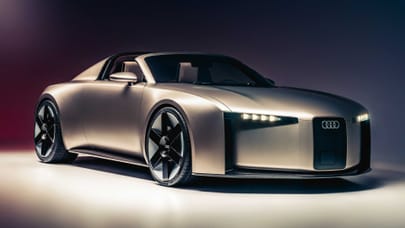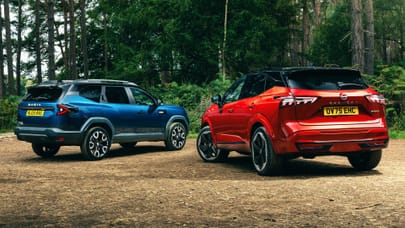
Clarkson on: future commuting
As I'm sure you know by now, I am no fan of the bus. In rural areas, I accept, of course, that it is a necessary evil because people who are too old to drive a car need to be able to get to the shops so they can buy potions for their phlebitis and tuna chunks for their cats.
But in cities? No. In cities, everything you ever need is only a short walk away, and if it isn't you can use a bicycle. And if you don't want to ride a bicycle, because you are, say, an adult, then you should buy a car. There is simply no need, then, in urban areas for a bus. It is too big, too noisy and as often as not it's full of rambling drunkards and murderists.
However, I've spent the last week or so in continental Europe, and it seems that many cities there have something even worse. It's called a tram, and I simply cannot see the point.
If you look on the internet, fans of the idea say they are trains that operate in city centres, but as we know, everyone on the internet is a swivel-eyed lunatic and so we must dismiss this notion straight away. A train is a long-distance tool which runs in a straight line. It cannot be converted to operate in a city centre, because it cannot turn left or right at a set of lights.
No. A tram is a bus, which as we've already explained is a waste of space. But it's worse than a bus because its power comes from overhead electricity cables. This means that many streets in the city have to be blanketed with high-voltage cables, which is extremely dangerous not just for tall people like me but also for small children. Because, as we keep being told, electricity, whether it comes from windmills, mobile phones or power stations, causes many different types of cancer.
There's another problem. Because the tram has to remain in contact with the wires that feed electricity to its motors, the driver cannot swerve if someone runs into his path. He must just sit there until his windscreen becomes all red and meaty.
I am always gripped by terror when I'm in a city that uses trams, because I know that if I accidentally stray into their path, I will definitely be killed. In Rome recently, I misread a sign while driving a Lamborghini Aventador and found myself sucked into a tunnel that was full of the damn things, and I don't mind admitting that quite a lot of poo came out.
It's bad enough trying to mix cars, pedestrians, cyclists and lorries. That's a recipe with disaster written all over it. But when you introduce blinkered unidirectional trams as well, you're going to address the housing shortage in double quick time, that's for sure. Because everyone will be dead.
What staggers me is that we have the ability today to build monorails. We see them at airports running on maglev synergy drive systems. This lifts public transport above the heads of the city's shoppers and is undoubtedly the solution. But instead, those in charge always say: "No. Let us use instead something from Dickensian times." It's madness, as stupid as saying you want to go to America in a sailing boat, rather than in an A380.
Which, of course, brings me to Edinburgh. Its new tram service opened a few weeks ago and was hailed by the BBC's online news service as a great success. But it's no such thing. The people of the city had to put up with closed roads and construction traffic for six years, and all they got was one 8.7-mile line that eventually cost north of £700 million. Twice the original estimate.
£700 million works out at £1,400 for every man, woman and child in the city. It would have been cheaper to provide every commuter in the city with a brand-new BMW i3. It is a criminal waste of money, and all so you can get from the city centre to the airport about six seconds faster than before.
The only good thing to come out of the fiasco is that every other city in Britain is now quietly dropping their plans to build a tram network. But even this comes with a worry, because we are talking about local councillors, and there's no telling what idiocy they may come up with instead. A new network of canals perhaps. Or a space hopper docking port.
Well, as usual, I have a plan which could be of some use. Since everyone is obsessed these days with the environment and living in the past, why not scrap all public transport and provide the residents of each city with a fleet of horses. Horses are sustainable and organic, and their exhaust discharge can be used to make the roses on all the municipal roundabouts much more vivid.
Horses are quieter than trams and don't need to be serviced very often. They are also cheaper to run. You don't have to plug a horse into overhead cables - unless it is behaving badly - and you don't need to fill it up with diesel every few hundred miles. Simply leave it in a city centre park while you're at work, and it will refuel itself on nothing but grass...
I will admit that horses are not comfortable. James, Richard and I went for a ride in Burma recently and after just a mile, I had a crushed teste, James had a ruined anus and Richard had a sprained wrist. But this is because we are unskilled. With a bit of practice, I think we could probably get the hang of it and then...? Well, certainly, I'd rather use a horse to get around London than a bicycle. A horse never gets a puncture, its chain never comes off and you don't have to pedal it, which means it's easier to get to the top of Notting Hill. Maybe they could be sponsored by Barclays and called Boris Horses.
I admit there would be one or two issues. If there are 150,000 commuter horses in London, that would result in around 40,000 gallons of horse urine splashing onto the streets every day. As well as three million pounds of manure, which would attract flies, which would spread diseases such as typhoid.
Also, we'd have to reckon on around 40 horses dying every day. Which would be yet another environmental hazard unless they were collected promptly. Which they wouldn't be if it were a council-run enterprise. So pretty soon, there'd be a dead bloated horse on every street corner which...
Hmm. Actually, the more I think about this, the more I reckon it won't work. So how's this for another plan? We stop messing about with Victorian solutions and accept that realistically there's only one sensible way of getting about these days. It's called "a car".
It won't give you typhoid, it doesn't cost £700m, it can be steered round pedestrians that have strayed into the road, it doesn't attract flies, it doesn't ruin your anus and it won't wander off in the night. Sounds perfect? That's because it is.
Top Gear
Newsletter
Thank you for subscribing to our newsletter. Look out for your regular round-up of news, reviews and offers in your inbox.
Get all the latest news, reviews and exclusives, direct to your inbox.








